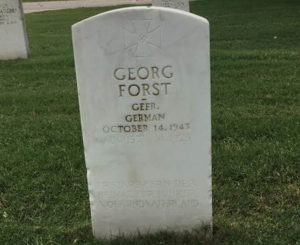Military Religious Freedom, Swastikas, and Police Officers
With politics, COVID-19, and racial tensions enrapturing the US public these past few months, there’s been little to discuss in the realm of military religious freedom. There has been little public movement in the case of the Manchester VA and the POW Bible. The decision to censor US Army chaplains, while significant, has quickly fallen out of the public view. (The conversation continues at higher levels, where there may yet be a coming resolution.)
As a result, Michael “Mikey” Weinstein – with a self-described “laser like” focus on religion in the US military – has had to find something else to talk about.
It started with a Weinstein complaint about headstones in a VA cemetery in San Antonio, TX, where German POWs from World War II are buried. It seems many Americans were unaware “enemy troops” were buried in our cemeteries at all, though there are actually quite a few. Two headstones had swastikas, which Weinstein decried. He left out the context: The headstones actually bore the German Iron Cross, a military medal, which the Soldiers had apparently held.
 It is not unusual for military decorations to be placed on headstones. The Iron Cross of Nazi Germany had a swastika within it. Two also had a phrase in German referring to Hitler. Despite the historical context (the headstones were placed when the men died during World War II) the VA agreed to address the headstones – after initially refusing – without specifying precisely how it would do so. At least one proposal includes adding markers to cemeteries to explain the presence of foreign POWs, which seems like a reasonable educational course of action.
It is not unusual for military decorations to be placed on headstones. The Iron Cross of Nazi Germany had a swastika within it. Two also had a phrase in German referring to Hitler. Despite the historical context (the headstones were placed when the men died during World War II) the VA agreed to address the headstones – after initially refusing – without specifying precisely how it would do so. At least one proposal includes adding markers to cemeteries to explain the presence of foreign POWs, which seems like a reasonable educational course of action.
Weinstein’s ‘hate symbol’ tactic (stripped of historical context) apparently worked, but it was ahead of its time. Cities around the country had not yet condoned tearing down statues or other symbols they considered offensive. By the time the nationwide riots started, the VA had backed down and Weinstein was forgotten.
Note that while there is much to be said on either side of that issue (and there are valid arguments on both sides), the complaint still had nothing to do with military religious freedom.
The next event was for Weinstein to complain about a US veteran serving on the police force in Walla Walla, Washington. The veteran, now-local police officer Nat Small, had been a Scout Sniper in the US Marines. Small has a Scout Sniper tattoo – an “SS” – that uses a font seemingly appropriated from Nazi Germany (though others note the band KISS uses the same type).
 The imagery was previously common among Marine Scout Snipers, though the US Marine Corps officially disavowed it in 2012 – after a Weinstein complaint. Small got the tattoo in 2010, and it includes the name of Marine Cpl Claudio Patino, who died in Small’s arms in Afghanistan in June 2010. That story is told in a now-viral Stars and Stripes article, whose header notes the tattoo controversy was dismissed by the Marines:
The imagery was previously common among Marine Scout Snipers, though the US Marine Corps officially disavowed it in 2012 – after a Weinstein complaint. Small got the tattoo in 2010, and it includes the name of Marine Cpl Claudio Patino, who died in Small’s arms in Afghanistan in June 2010. That story is told in a now-viral Stars and Stripes article, whose header notes the tattoo controversy was dismissed by the Marines:
The investigation concluded that the Marines made a “naïve mistake,” and none of them were disciplined because, the Corps said, there was no malicious intent.
While Small wears long sleeves to cover the tattoo while on duty as a police officer, Weinstein has declared that to be insufficient, saying his MRFF would
file a suit against the city of Walla Walla if a local police officer’s double lightning bolt “SS” tattoo isn’t removed or altered or the officer isn’t removed from the Walla Walla Police Department.
Weinstein’s group “supported and participated” in a protest at the Police Department – which resulted in about 40 people supporting Weinstein’s cause, while about 500 counter-protested in support of the police.
Those numbers about match Weinstein’s most famous “protest,” in which his own security detail made up 10% of the crowd.
In Weinstein’s defense – shocking, right? – it is valid to question whether how people present themselves is consistent with their character. If a person chooses to communicate a message with how they dress or decorate their bodies, that message may be a valid point of discussion – particularly if that person purports to represent others as an employee or a public servant.
In Small’s case, that question has been asked and answered, first by the Stars and Stripes story, then by his decision to cover the tattoo on duty, and again by the reputation he has in the community. Note that no one has made the slightest accusation that Small has any Nazi sympathies; no one has objected to Small’s character. The agitators – many of whom are not local and don’t know Small – are focused on body art that isn’t even visible when he presents himself as a public servant.
While the “cancel culture” would dictate that Small be fired, it seems that common sense – and the “silent” majority – has prevailed, at least temporarily.
That’s it. The story should be over. Weinstein’s personal interest seems to be to latch on to a story that some may think has a nexus between hate and the police, simply because that’s the popular thing right now. In this case, though, the only hate being demonstrated is by those who are attacking the character and career of a man for no other reason than a tattoo.
Note, again, that this story has nothing to do with religion and the US military.
Apparently, religious freedom in the US military is doing pretty well, if Mikey Weinstein’s “Military Religious Freedom Foundation” has no military religious freedom issues to address. Or, perhaps, the dearth of scandals meant Weinstein – who relies on publicity for donations to a “charity” that largely funds his own paycheck – was having a slow year.
ADVERTISEMENT
Hopefully Mikey’s anger will be cancelled soon. Perhaps his doctor will give Mikey a tranquilizer.